Mickalene Thomas
Afro Goddess with Hand Between Legs, 2006
Chromogenic print
48 x 60 inches
On loan from the Collection of Moses Luski
On view in True Likeness until Sunday, March 28th.
Please note: All buildings on campus, including the Van Every/Smith Art Galleries are only open to Davidson students, faculty and staff due to the pandemic.
Exploring intersections of race within the literary and visual world, Dr. Suzanne Churchill’s ENG 390 class, Word-Art: Seeing in Black and White, took advantage of the True Likeness exhibition to supplement the curriculum. Portraiture, whether through traditional or non-traditional means, allows for the examination of self and all identities that contribute to oneself. Given that, Dr. Churchill formulated an assignment to respond to and interact with this idea of identity and vocalization of self. Titled “Talking Image,” the assignment – one among several non-traditional essays throughout the course – allowed students to adopt one of the pieces in True Likeness and speak as the piece. Dr. Churchill’s assignment description instructed students to write “as if the artwork itself is speaking, incorporating images or other media if necessary. You’re not writing from the perspective of the artist or the person portrayed, but from the POV of the artwork itself” (Dr. Churchill / Word-Art).
As a student in Word-Art, I became fascinated with the assignment not only because of its unconventional nature, but also because of the opportunity to visit the VAC and stand next to the artwork to recite it in person.
I instantly gravitated toward Mickalene Thomas’s, Afro Goddess With Hand Between Legs. The magnetic pull of the figure’s intense, deeply captivating eyes drew me towards her and locked me in. As I am used to seeing the odalisque in Western artwork depict predominantly white women, I wanted to unpack Thomas’s depiction of the odalisque of a Black woman. Ultimately, through the use of gaze, clothing, patterns, and symbolism, the Black woman in the piece successfully reclaims her identity and sexuality.
However, I soon realized that I had come to a roadblock in the assignment: there was no way that I, as a white privileged woman, could speak for the figure in Thomas’s piece. I did not want to impose my whiteness upon her, as she has clearly worked very hard to overcome this oppression.
Therefore, I began to think of ways that I could speak for the artwork as a whole, rather than the figure. I landed in a place of speaking for every manifestation of whiteness around the figure that is trying to exploit her. My poem, “‘Afro Goddess’ disembodying whiteness” aims to embody the artwork in a way that highlights the figure’s agency and power.
“‘Afro Goddess’ disembodying whiteness”
I am the leopard print, instructing you to embody the beast.
I am the patterned fabric, intending to exploit what was originally yours.
I am the Afro, shaming you for your natural Blackness.
I am the odalisque, directing you to surrender your agency.
I am Hollywood, profiting off of blaxploitation films that continually perpetuate stereotypes.
I am the West, colonizing your identity.
I taunt you with your past
That I have made mine.
Your culture, your clothes, your music, your body.
Mine, now. Mine, then. Mine, forever?
No.
Somehow, someway, you persist, once again.
Back breaking work built up until one, big, burst.
Dear, “Afro Goddess with Hand Between Legs,”
How have you turned this all around on me?
I deliberately engulf your body, desperately trying to control your mind, as well.
I ask you, “Afro Goddess,” how is it that you resist my
Systemically powerful and privileged whiteness?
I know:
Eyes staring, puncturing my slowly dwindling power over you
bridging the gap between art and reality to face me head on.
Eyes of intensity. Eyes of potential. Eyes of power.
Afro free, failing to give into my Western expectations.
Natural beauty challenging my white-washed version of you.
Body language reclining to reclaim your sexuality that was so often eroticized.
Taking back what is yours and exuding bold, authoritative vulnerability.
Richard Dyer claims there is “no more powerful position than that of being ‘just’ human.”
I’ve claimed that title to denote yours under a sea of
Racialized inhumane humanity.
I am ‘just’ human,
And I have made you anything but human.
You are embodying Blackness,
Or perhaps, more accurately,
Disembodying whiteness.
Years of fervently fighting oppression all comes down to
This.
You, Afro Goddess.
You, Mickalene Thomas.
You, beautiful Black power.
Reclaiming centuries of stolen sexuality, sovereignty, and self identity.
I relent.
– Ellie Salyers ’24
Works Cited:
Dyer, Richard. “The Matter of Whiteness.” White, Routledge, 1997, 2.
Thomas, Mickalene. Afro Goddess with Hand Between Legs. 2006. The Studio Museum in Harlem, https://studiomuseum.org/collection-item/afro-goddess-hand-between-legs

